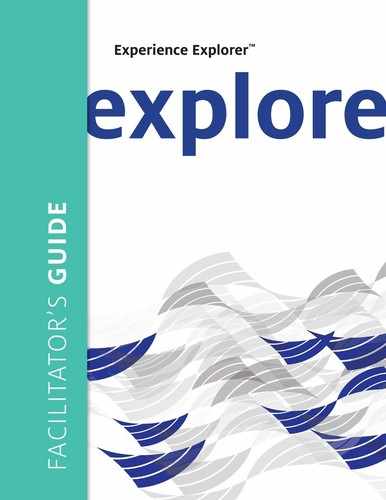Experience Explorer can be used in any number of ways and with all kinds of people. Most commonly, groups of leaders have used it to talk about their work and life experiences, to gain insights about how to develop themselves and others, and to map out their future development. In practice, there are few limits to the tool’s use.
It works with groups of almost any size. A leader can use it alone for self-reflection. As a one-on-one coaching tool, Experience Explorer can work as a conversation starter and help people develop a rapport so that they can more fully share their lessons of experience, including the emotional impact. It can help small groups engage in and support developmental conversations in settings such as breakout groups at a conference or during training sessions. It has also been used successfully as a networking activity with large groups.
You can use Experience Explorer with almost any type of audience and in various institutional settings, including public and private businesses, government agencies, nonprofit organizations, and educational units. It works across organizational departments and functions, such as finance, human resources, operations, research and development, sales, and marketing, and with people in various professions and at different levels in the same organization. Graduate and undergraduate students can also benefit from using Experience Explorer because it can help them validate some of their experiences and anticipate what they will face once they join an organization. Younger students at school and in extracurricular programs, camps, and retreats can use it to identify, share, and learn from each other’s experiences. The purpose for using the tool doesn’t have to be explicitly related to leadership. For a younger group, an activity might deal with what they have learned about working with others or about what their experiences say about themselves.
The core issue that Experience Explorer tackles is profoundly simple: How can leaders and managers make learning from their experiences intentional, not incidental or accidental?
During a session, the cards encourage participants to remember and reflect on experiences they have had during their careers and what they have learned from those experiences.
As leaders reflect on and share their most pivotal incidents, events, and encounters, they uncover the lessons that they have learned and used. As they listen to others share their experiences, leaders see how varied experiences lead to many different lessons. The insights they gain from the session can be shared with others and used immediately, or used to plan the developmental experiences they need to broaden and deepen their capacity to lead. Simply put, Experience Explorer validates and reinforces lessons learned from experiences.
There are many ways in which leaders can benefit from using Experience Explorer. For instance, they can
• assist others to map their career journeys
• quickly identify their leadership strengths and gaps
• help generate profiles of the capabilities necessary to succeed in different roles and functions in their organizations
• identify experiences that develop the capabilities important to the organization
• stimulate reflection about memorable experiences that have taught critically important lessons about leadership and management
• provoke in-depth conversations about how to become an effective leader and manager
• give themselves and others the means to reflect on how they learn and how they approach situations that call for new learning
• create bonds of camaraderie in teams and between groups of people
• strengthen connections between senior, mid-level, and junior professionals and among people from different cultural backgrounds
• spark engagement and enthusiasm with team members and others
• facilitate social interactions at a networking event
Experience Explorer fits a variety of situations. It can be used in small-group workshops focused exclusively on experiences and lessons or as a short activity in a longer, broader, training-and-development class.
Different Places, Different Lessons

The lesson that matters the most to senior executives in Singapore, China, the U.S., and India is managing direct reports or subordinates. Among other top lessons learned are self-awareness, executing effectively, and integrity. Executing effectively is not among the top lessons in the U.S., and integrity is among the top three lessons in Singapore, China, and the U.S. but not India. India is unique in reporting confidence as the second most important lesson learned by its senior executives.
For example, Experience Explorer can be used when an organization wants to document and analyze the experiences that most effectively develop the leadership skills required in different roles, across functions and geographies. With that information, organizations can customize talent development.
On a smaller scale, Experience Explorer can be used when leaders want to share their experiences with peers, direct reports, and others as a way to coach how lessons learned translate into strategic career plans and lead to more effective leadership.
Most people—managers, team leaders, trainers, facilitators, human-resource professionals, or training-and-development consultants—can all conduct a basic 60- to 90-minute Experience Explorer session. In most cases, it’s sufficient to follow the instructions in this guide and to provide some basic directions to the people attending the session. After the participants receive a few simple instructions, the activity practically runs itself.
Beyond this, the facilitator needs only basic content knowledge corresponding to the session’s objectives. For example, if the objective of the session is to reflect on how bosses and superiors can be influenced, or crises can be managed, or a cross-cultural assignment can be handled successfully, then the facilitator must have foundational knowledge of influencing skills, crisis management, or effective cross-cultural management.
